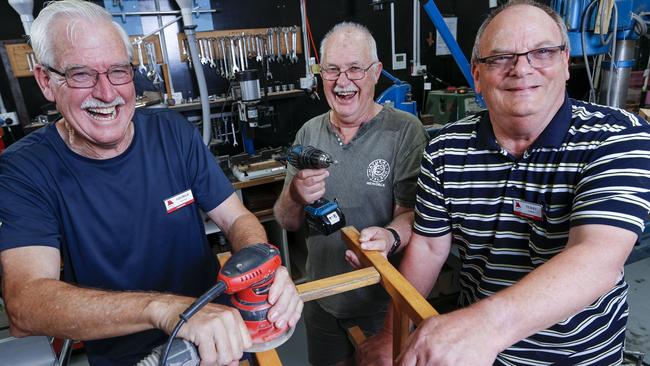Men’s Sheds may come in handy for women and less-skilled blokes
Years of success in fighting post-retirement blues has sparked new ideas.

On Valentine’s Day, 2011, Noel Findley’s heart was racing as he walked up the path towards a large, nondescript shed in Cessnock, NSW.
But he wasn’t aflutter for reasons of romance. He’d just shared a pleasant breakfast with his wife.
Findley was anxious at the thought of spending time with a bunch of strange men.
Having been forced into early retirement as a boilermaker due to health problems, Findley had spent most of the past six years at home, battling depression.
“I would be sitting in the lounge and I’d just start crying,” he says.
“It seemed that the weight of the world was on my shoulders.”
Since that day at the Cessnock Men’s Shed things have changed for the better.
“When I went into the shed someone came up to me and said, ‘Do you want to do something?’
“They needed a guard for a fan belt so I grabbed some steel and welded one together. And they said, ‘Oh, that was quick’, and that’s when I knew this place was for me,” he says.
Retirement can increase the likelihood of clinical depression by up to 40 per cent, studies show.
The Australian Men’s Shed Association was formed in 2007, combining a number of sheds that had spontaneously arisen across the country. In 2010, $3 million was granted to AMSA as part of Australia’s first national male health policy. Australia now has more than 980 sheds, and more have sprung up in Britain, Ireland, New Zealand, Canada and the US.
“Years ago the theory was that you get a dozen men in a room with a facilitator and sit them down and say, ‘OK, let’s all talk about our problems’,” AMSA chief executive David Helmers says.
“A dozen burly blokes in that scenario, it just doesn’t work. But the way the men’s shed works is, you take those same dozen blokes but replace the facilitator with a broken lawnmower, give them some tools, and say, ‘Fix this’. If you come back in a few hours they would have discussed all their problems and be having a very open conversation. Perhaps the lawnmower still won’t work, but it was irrelevant in the first place.
“There are more men’s sheds than there are McDonald’s. I would estimate up to a quarter of a million blokes in Australia attend men’s sheds in some capacity.”
But as the sheds tinker through a second decade, their success has brought new and controversial ideas such as allowing women in or creating meeting places for blokes who aren’t as handy.
Helmers points out that many men’s sheds do not have the legal option to exclude women. “Most sheds are on public ground and no crown land department is going to allow the facilities to be used exclusively by one particular group, or discriminate against another group,” he says.
He supports allowing women into men’s sheds. “We find with women joining the sheds that they want to learn skills or they’ve got a very good reason for wanting to join, but they fully respect that it’s a male domain,” he says.
“It’s very small numbers. Some sheds will have specific women’s days. Some will have a formal women’s auxiliary group.”
Jan Morgan, 76, is a member of the Grawin-Glengarry Sheepyards Opal Fields Men’s Shed. The shed has 20 members, four of whom are women.
“Women can contribute a lot to the sheds,” she says. “Out here on the fields there’s a lot of the girls who go mining, they drive trucks, they start generators, so we all work together to do what we’re capable of doing. And we get friendship and social interaction from the shed, same as the men.”
Morgan admits that some of the men were against her joining at first, but have since accepted it, particularly when they saw the benefits.
“When I make scones with strawberry jam and fresh cream, I do four dozen in one hit and they go in five minutes,” she says.
Community development volunteer Ian McDougall, of Southport, Queensland, encouraged his father, Ronald, to join a men’s shed when he noticed the 77-year-old was unhappy.
“But the shed didn’t really suit him,” he says.
“He wasn’t a woodworker and with hearing loss found communication and engagement difficult in that environment.”
This inspired McDougall to come up with an alternative.
“I called my idea Blokes Lounge,” he says.
“I envisioned a house or some place where men could meet in an informal environment and come and go as they pleased.”
The lounge was initially in the Broadbeach library. It now boasts 74 members who meet fortnightly at the Surfers Paradise Golf Club. As well as the meetings, the group runs activities such as cycling, card playing, golf and barbecues.
McDougall defends a decision to keep women out of the lounge. “We want an environment where men are comfortable with other men and able to talk about issues from a male perspective,” he says.
Retired dentist Rollo Meyers, 79, says lounge members “come from all different walks of life” but the men need their own group.
“Women often like different things to men,” he says. “My wife has her girlfriends and she likes touring and shopping, whereas in general men like a bit more action and adventure. So when we get home at night time we’ve got different things to talk about.”



To join the conversation, please log in. Don't have an account? Register
Join the conversation, you are commenting as Logout